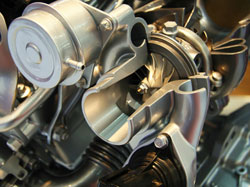FIRE® - advanced engine simulation software
Europe faces strong competition from the United States and Japan in the automotive industry. Given the rising profile of climate change, the environmental performance of cars has taken on new importance. The Energy, Environment and Sustainable Development Programme supported the MINKNOCK project consortium's efforts to make Europe's vehicle fleets more fuel-efficient by reducing engine knock. Modelling can play an important role in improving our understanding of the complex thermodynamic phenomena occurring inside the internal combustion engine. AVL, a world leader in automotive three-dimensional Computational Fluid Dynamics (3-D CFD), was a key member of the MINKNOCK consortium. AVL owns a sophisticated 3-D CFD simulation package entitled FIRE® that is suitable for a number of engine-related applications. Its core is the Semi IMplicit Pressure Linked Equations (SIMPLE), which are solved using advanced mathematical techniques. Its ability to deal with variable topology allows it to effectively simulate the effect of geometry on fuel injection, the combustion chamber, exhaust flow, etc. During MINKNOCK, AVL upgraded FIRE® with new submodels that better predict the onset of engine knock. Specifically, a Phase Optimised Skeleton Mechanism (POSM) was developed for the reaction of n-heptane with iso-octane. This is then coupled with a Transported Probability Density Function (t-PDF). The new version of FIRE® proved extremely valuable to the MINKNOCK consortium in their attempts to learn how to eliminate knock in modern engine design.







